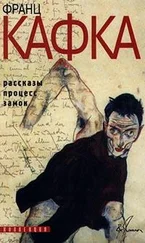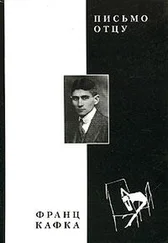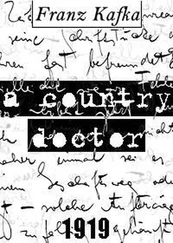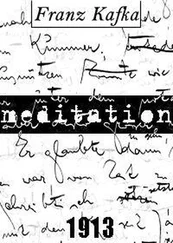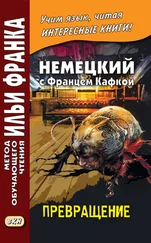The Officer had hardly noticed the earlier indifference of the Traveler, but he did have a sense now of how the latter's interest was being aroused for the first time. So he paused in his explanation in order to allow the Traveler time to observe the apparatus undisturbed. The Condemned Man imitated the Traveler, but since he could not put his hand over his eyes, he blinked upward with his eyes uncovered.
"So now the man is lying down," said the Traveler. He leaned back in his chair and crossed his legs.
"Yes," said the Officer, pushing his cap back a little and running his hand over his hot face. "Now, listen. Both the bed and the inscriber have their own electric batteries. The bed needs them for itself, and the inscriber for the harrow. As soon as the man is strapped in securely, the bed is set in motion. It quivers with tiny, very rapid oscillations from side to side and up and down simultaneously. You will have seen similar devices in mental hospitals. Only with our bed all movements are precisely calibrated, for they must be meticulously coordinated with the movements of the harrow. But it's the harrow which has the job of actually carrying out the sentence."
"What is the sentence?" the Traveler asked. "You don't even know that?" asked the Officer in astonishment and bit his lip. "Forgive me if my explanations are perhaps confused. I really do beg your pardon. Previously it was the Commandant's habit to provide such explanations. But the New Commandant has excused himself from this honourable duty. The fact that with such an eminent visitor"—the traveler tried to deflect the honour with both hands, but the officer insisted on the expression—"that with such an eminent visitor he didn't even once make him aware of the form of our sentencing is yet again something new, which … " He had a curse on his lips, but controlled himself and said merely: "I was not informed about it. It's not my fault. In any case, I am certainly the person best able to explain our style of sentencing, for here I am carrying"—he patted his breast pocket—"the relevant diagrams drawn by the previous Commandant."
"Diagrams made by the Commandant himself?" asked the Traveler. "Then was he in his own person a combination of everything? Was he soldier, judge, engineer, chemist, and draftsman?"
"He was indeed," said the Officer, nodding his head with a fixed and thoughtful expression. Then he looked at his hands, examining them. They didn't seem to him clean enough to handle the diagrams. So he went to the bucket and washed them again. Then he pulled out a small leather folder and said, "Our sentence does not sound severe. The law which a condemned man has violated is inscribed on his body with the harrow. This Condemned Man, for example," and the Officer pointed to the man, "will have inscribed on his body, ‘Honour your superiors.'"
The Traveler had a quick look at the man. When the Officer was pointing at him, the man kept his head down and appeared to be directing all his energy into listening in order to learn something. But the movements of his thick pouting lips showed clearly that he was incapable of understanding anything. The Traveler wanted to raise various questions, but after looking at the Condemned Man he merely asked, "Does he know his sentence?" "No," said the Officer. He wished to get on with his explanation right away, but the Traveler interrupted him: "He doesn't know his own sentence?" "No," said the Officer once more. He then paused for a moment, as if he was asking the Traveler for a more detailed reason for his question, and said, "It would be useless to give him that information. He experiences it on his own body." The Traveler really wanted to keep quiet at this point, but he felt how the Condemned Man was gazing at him—he seemed to be asking whether he could approve of the process the Officer had described. So the Traveler, who had up to this point been leaning back, bent forward again and kept up his questions, "But does he nonetheless have some general idea that he's been condemned?" "Not that either," said the Officer, and he smiled at the traveler, as if he was still waiting for some strange revelations from him. "No?" said the Traveler, wiping his forehead, "then does the man also not yet know how his defence was received?" "He has had no opportunity to defend himself," said the Officer and looked away, as if he was talking to himself and wished not to embarrass the Traveler with an explanation of matters so self–evident to him. "But he must have had a chance to defend himself," said the Traveler and stood up from his chair.
The Officer recognized that he was in danger of having his explanation of the apparatus held up for a long time. So he went to the Traveler, took him by the arm, pointed with his hand at the Condemned Man, who stood there stiffly now that the attention was so clearly directed at him—the Soldier was also pulling on his chain—and said, "The matter stands like this. Here in the penal colony I have been appointed judge. In spite of my youth. For I stood at the side of our Old Commandant in all matters of punishment, and I also know the most about the apparatus. The basic principle I use for my decisions is this: Guilt is always beyond a doubt. Other courts could not follow this principle, for they are made up of many heads and, in addition, have even higher courts above them. But that is not the case here, or at least it was not that way with the previous Commandant. It's true the New Commandant has already shown a desire to get mixed up in my court, but I've succeeded so far in fending him off. And I'll continue to be successful. You want this case explained. It's simple—just like all of them. This morning a captain laid a charge that this man, who is assigned to him as a servant and who sleeps before his door, had been sleeping on duty. For his task is to stand up every time the clock strikes the hour and salute in front of the captain's door. That's certainly not a difficult duty—and it's necessary, since he is supposed to remain fresh both for guarding and for service. Yesterday night the captain wanted to check whether his servant was fulfilling his duty. He opened the door on the stroke of two and found him curled up asleep. He got his horsewhip and hit him across the face. Now, instead of standing up and begging for forgiveness, the man grabbed his master by the legs, shook him, and cried out, ‘Throw away that whip or I'll eat you up.' Those are the facts. The captain came to me an hour ago. I wrote up his statement and right after that the sentence. Then I had the man chained up. It was all very simple. If I had first summoned the man and interrogated him, the result would have been confusion. He would have lied, and if I had been successful in refuting his lies, he would have replaced them with new lies, and so forth. But now I have him, and I won't release him again. Now, does that clarify everything? But time is passing. We should be starting the execution, and I haven't finished explaining the apparatus yet."
He urged the traveler to sit down in his chair, moved to the apparatus again, and started, "As you see, the shape of the harrow corresponds to the shape of a man. This is the harrow for the upper body, and here are the harrows for the legs. This small cutter is the only one designated for the head. Is that clear to you?" He leaned forward to the Traveler in a friendly way, ready to give the most comprehensive explanation.
The Traveler looked at the harrow with a wrinkled frown. The information about the judicial procedures had not satisfied him. However, he had to tell himself that here it was a matter of a penal colony, that in this place special regulations were necessary, and that one had to give precedence to military measures right down to the last detail. Beyond that, however, he had some hopes in the New Commandant, who obviously, although slowly, was intending to introduce a new procedure which the limited understanding of this Officer could not cope with.
Читать дальше


